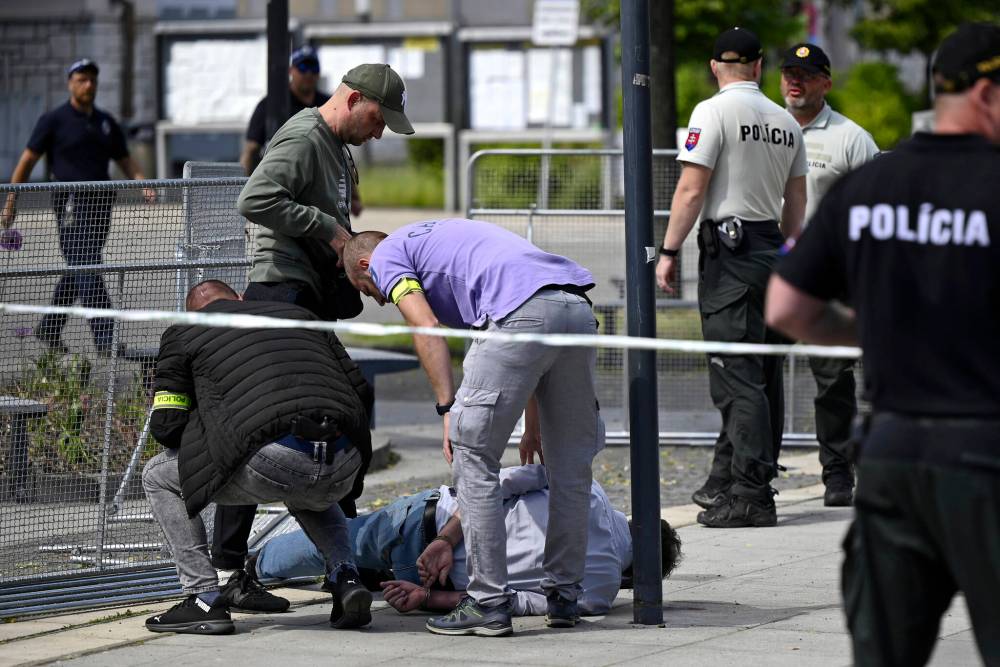Assassination attempt on low rung of escalation ladder
Advertisement
Read this article for free:
or
Already have an account? Log in here »
To continue reading, please subscribe:
Monthly Digital Subscription
$0 for the first 4 weeks*
- Enjoy unlimited reading on winnipegfreepress.com
- Read the E-Edition, our digital replica newspaper
- Access News Break, our award-winning app
- Play interactive puzzles
*No charge for 4 weeks then price increases to the regular rate of $19.00 plus GST every four weeks. Offer available to new and qualified returning subscribers only. Cancel any time.
Monthly Digital Subscription
$4.75/week*
- Enjoy unlimited reading on winnipegfreepress.com
- Read the E-Edition, our digital replica newspaper
- Access News Break, our award-winning app
- Play interactive puzzles
*Billed as $19 plus GST every four weeks. Cancel any time.
To continue reading, please subscribe:
Add Free Press access to your Brandon Sun subscription for only an additional
$1 for the first 4 weeks*
*Your next subscription payment will increase by $1.00 and you will be charged $16.99 plus GST for four weeks. After four weeks, your payment will increase to $23.99 plus GST every four weeks.
Read unlimited articles for free today:
or
Already have an account? Log in here »
Hey there, time traveller!
This article was published 23/05/2024 (527 days ago), so information in it may no longer be current.
Madeleine Albright, the former U.S. secretary of state, once called Slovakia “the black hole at the heart of Europe,” which seems a harsh judgment on five million Slovaks. The assassination attempt on Prime Minister Robert Fico was alarming, but we can narrow the problem down to a more specific group of people.
Albright was really talking about the gang of ex-communists in which Fico honed his political skills. Some were violent thugs from the start, and their tactics have enabled them to hold power in Slovakia for almost half the time since Communist rule was overthrown in 1989. But first, let’s be clear on what this attempted assassination did not mean.
It does not herald a new era of political extremism in Europe. It stands on the lowest rung of the escalation ladder, in which some ‘lone wolf’ individual with obscure or unknown motives tries to kill a prominent political figure.

The second rung of the ladder is when governments arrange the killing of opponents at home or abroad. This is fairly common, and ranges from India ordering contract killings of Sikh nationalists in Canada to Israel killing Iranian generals with ballistic missiles in Iran’s embassy in Syria. It is seen as very naughty, but not worth a war for.
The highest level is reached when governments arrange the murder of the heads of other governments. That is very rare, because the consequences can be unpredictable and extreme.
However, the events in Slovakia last week will not cause a war. “We are on the doorstep of a civil war,” warned Matúš Šutaj Eštok, the interior minister in Fico’s government, stirring up panic while pretending to calm it, but Slovakia is nowhere near that.
Fico’s Smer Party is the kind of nationalist-populist organization that is now commonplace in eastern Europe. It tries to shut down opposition media — “hyenas, idiots, and anti-Slovak prostitutes,” in Fico’s words — and it likes Putin’s regime in Russia. It loathes Jews, Roma, gays, Ukrainians and the European Union (although it takes EU money).
In other words, Fico is the lost twin to Hungary’s Prime Minister Viktor Orbán. They are both cousins to Poland’s Jarosław Kaczynski (except that his Law and Justice Party, being Polish, is deeply pro-Catholic and anti-Russian). And they all look hard-right, but it’s more complicated than that.
The fact, generally unmentioned in polite company, is that most underskilled, poorly educated people did better under the Communist regimes than they are doing now. They are getting old, which makes them feel even more excluded. And since Eastern European countries have very low birth rates, they are still quite a big chunk of the adult population.
So if you are an ambitious younger politician who is flexible on ideology, this is the voting group you need to appeal to: disappointed, left-behind, and with all the old national prejudices intact. Orbán started out as a liberal firebrand and he managed to find them; Fico started out as a careerist young communist and he found them too.
This cohort are not stereotypically ‘right wing.’ They dislike minorities and fear immigration, but they are all in favour of big state welfare spending. They are not much concerned about human rights and media freedoms, and a little rough stuff doesn’t bother them either.
The attack on Fico was a much bigger deal and of course they are concerned, but they are unlikely to respond with violence. After all, their party is still safely in power — and anyway, it’s not clear who they should attack.
The man who shot Fico, Juraj Cintula, was a 71-year-old retired security guard with no known political ties, although acquaintances say he had previously supported some of Fico’s policies and opposed others. We don’t know what he was thinking last Wednesday, but it seems to have been a fairly random event.
Fico will survive, although his injuries are clearly life-changing. There is a ‘surge’ in violent rhetoric in Europe, but not in actual violence. As for the voting block that empowers people like Fico, it is aging out one year at a time.
Gwynne Dyer’s new book is Intervention Earth: Life-Saving Ideas from the World’s Climate Engineers.


